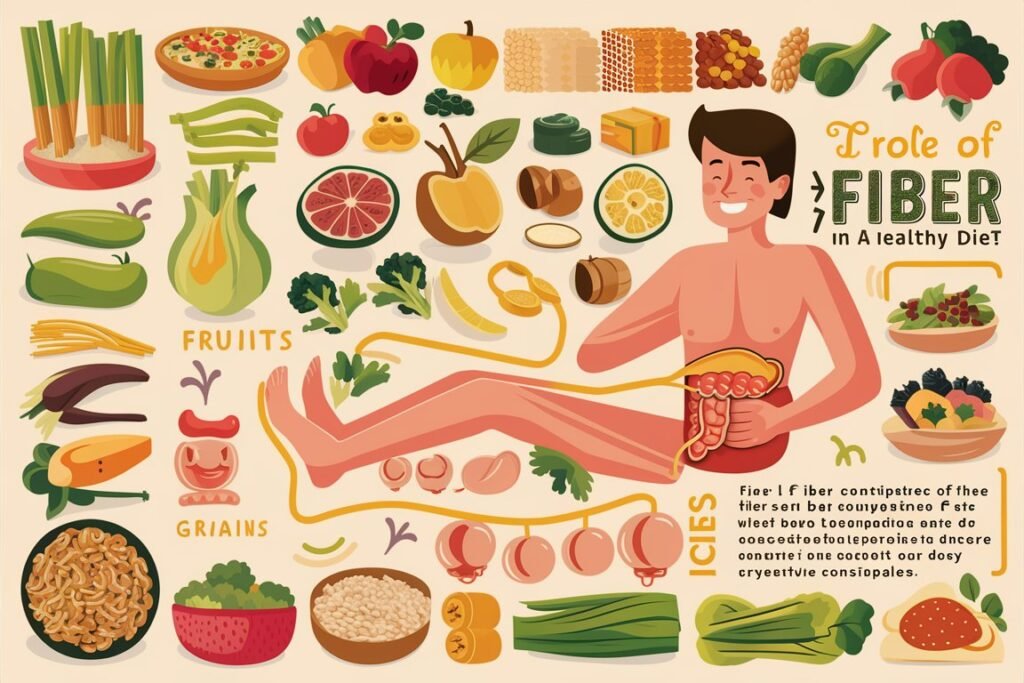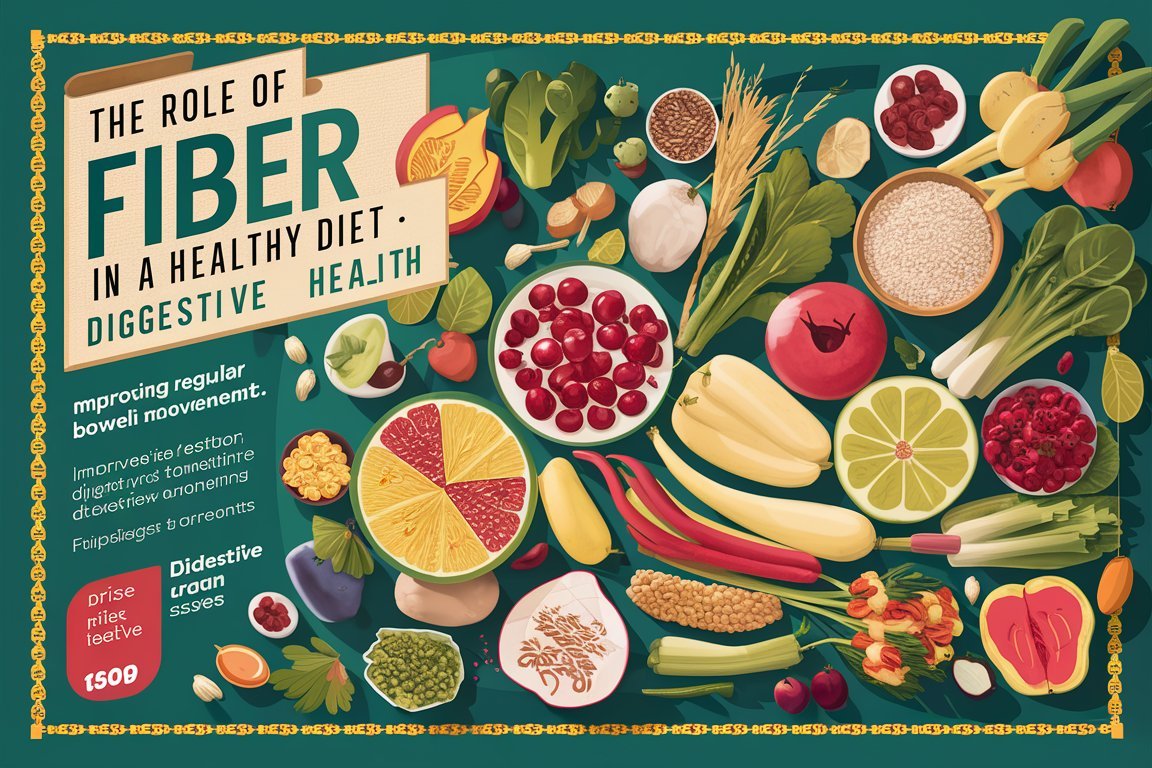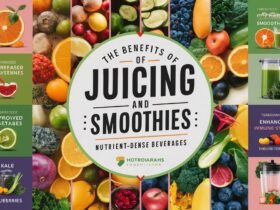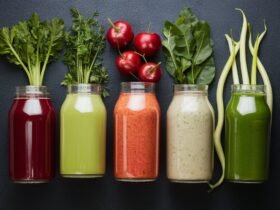The Role of Fiber in a Healthy Diet: Promoting Digestive Health
Hey there, my young and curious friends of 2024! It’s your favorite nutrition detective, Nita Sharda, here to take you on a fascinating journey into the world of fiber and digestive health. Now, I know what you might be thinking – “Fiber? That sounds like something only grown-ups talk about!” But trust me, understanding the importance of fiber in our diets is super important for everyone, no matter what age we are.
Today, we’re going to put on our detective hats and investigate how fiber can help keep our digestive systems running smoothly and why it’s such an important part of a healthy diet. But before we dive in, let me make one thing clear – this is not about putting anyone on a strict diet or making them feel bad about what they eat. It’s simply about empowering you with the knowledge and tools to make gut-friendly choices, now and in the future.
So, are you ready to crack the case of fiber and digestive health with me? Let’s go!
What is Fiber?
First things first, let’s talk about what fiber actually is. Fiber is a type of carbohydrate that our bodies can’t digest or absorb. Instead, it passes through our digestive system relatively intact, helping to keep things moving along smoothly.
There are two main types of fiber: soluble and insoluble. Soluble fiber dissolves in water and forms a gel-like substance in our gut, which can help slow down digestion and make us feel full and satisfied. Insoluble fiber, on the other hand, doesn’t dissolve in water and helps add bulk to our stool, making it easier to pass through our digestive system.
Both types of fiber are important for maintaining good digestive health, and we need a balance of both in our diets to keep things running smoothly.
The Benefits of Fiber for Digestive Health
So, why is fiber so important for our digestive health? Well, it turns out that fiber can do a lot of really cool things in our gut, like:
1. Keeping Us Regular
One of the most important jobs of fiber is to help keep us regular. When we eat enough fiber, it helps add bulk to our stool and makes it easier to pass through our digestive system. This can help prevent constipation and keep things moving along smoothly.
Insoluble fiber is especially important for promoting regularity, as it helps “sweep” our digestive system clean and prevents waste from getting stuck along the way.
2. Feeding Our Friendly Gut Bacteria
Did you know that we have trillions of tiny microbes living in our gut? These friendly bacteria, also known as our gut microbiome, play a really important role in our overall health and well-being.
Fiber, especially soluble fiber, acts as a prebiotic, which means it feeds our friendly gut bacteria and helps them thrive. When our gut bacteria are well-fed and happy, they can do their job of keeping our digestive system healthy and strong.
3. Reducing the Risk of Digestive Disorders
Eating a diet that’s high in fiber has been linked to a lower risk of several common digestive disorders, like:
- Hemorrhoids: Swollen veins in the rectum or anus that can be painful and uncomfortable
- Diverticulitis: Inflammation or infection of small pouches that can form in the lining of the digestive tract
- Irritable Bowel Syndrome (IBS): A common digestive disorder that can cause abdominal pain, bloating, and changes in bowel habits

By keeping our digestive system running smoothly and promoting the growth of healthy gut bacteria, fiber can help reduce our risk of developing these and other digestive problems.
4. Promoting Colon Health
Fiber may also play a role in promoting the health of our colon, which is the last part of our digestive tract. Some studies have suggested that a diet high in fiber may help reduce the risk of colon cancer, although more research is needed to fully understand this link.
Fiber may help protect our colon by promoting the growth of healthy gut bacteria, reducing inflammation, and helping to move waste through our digestive system more quickly.
Fiber-Rich Foods to Include in Your Diet
Okay, so now that we know why fiber is so important for our digestive health, let’s talk about some specific foods that are great sources of fiber. Here are some fiber-rich foods to include in your diet:
1. Fruits and Vegetables
Fruits and vegetables are some of the best sources of fiber in our diets. In general, the more colorful the fruit or veggie, the higher it is in fiber and other important nutrients.
Some great high-fiber fruits and veggies include:
- Berries, like raspberries, blackberries, and strawberries
- Pears and apples with the skin on
- Avocados
- Leafy greens, like spinach, kale, and Swiss chard
- Broccoli and Brussels sprouts
- Sweet potatoes and winter squash
Aim to include a variety of colorful fruits and veggies in your diet every day to get a good mix of both soluble and insoluble fiber.
2. Whole Grains
Whole grains, like whole wheat bread, brown rice, and quinoa, are another great source of fiber in our diets. Unlike refined grains, which have had the bran and germ removed, whole grains contain all three parts of the grain kernel, including the fiber-rich bran.
Some great high-fiber whole grains to include in your diet are:
- Oats and oatmeal
- Whole wheat bread and pasta
- Brown and wild rice
- Quinoa and other ancient grains like farro and barley
- Popcorn (yes, popcorn is a whole grain!)
Try swapping out refined grains for whole grains whenever possible to boost your fiber intake.
3. Legumes
Legumes, like beans, lentils, and peas, are a fantastic source of both soluble and insoluble fiber. They’re also rich in plant-based protein and other important nutrients like iron and folate.
Some great high-fiber legumes to include in your diet are:
- Black beans and kidney beans
- Chickpeas (also known as garbanzo beans)
- Lentils
- Split peas
- Edamame (soybeans)
Try adding legumes to salads, soups, and stews, or using them as a meat substitute in tacos and other dishes.
4. Nuts and Seeds
Nuts and seeds are another great source of fiber, as well as healthy fats and plant-based protein. They make a great snack or addition to meals like oatmeal and yogurt.
Some high-fiber nuts and seeds to include in your diet are:
- Almonds and almond butter
- Chia seeds and flaxseeds
- Pumpkin seeds and sunflower seeds
- Pistachios and pecans
- Walnuts
Just remember to enjoy nuts and seeds in moderation, as they can be high in calories.
Tips for Adding More Fiber to Your Diet
Now that we know some of the best sources of fiber, let’s talk about some easy ways to add more fiber to our diets. Here are some tips to get you started:
1. Make Fruits and Veggies the Star of Your Plate
Aim to fill half your plate with colorful fruits and veggies at every meal. This will help ensure that you’re getting a good mix of both soluble and insoluble fiber, as well as other important nutrients.
2. Choose Whole Grains Over Refined Grains
Whenever possible, choose whole grain breads, pastas, and cereals over their refined counterparts. Look for products that list a whole grain, like whole wheat or brown rice, as the first ingredient.
3. Add Legumes to Your Meals
Try incorporating legumes, like beans and lentils, into your meals a few times a week. They make a great addition to salads, soups, and stews, and can even be used as a meat substitute in dishes like tacos and chili.
4. Snack on Fiber-Rich Foods
When you’re feeling hungry between meals, reach for fiber-rich snacks like fresh fruits and veggies, a handful of nuts or seeds, or a small bowl of popcorn.
5. Drink Plenty of Water
Fiber works best when it absorbs water, so it’s important to drink plenty of fluids throughout the day. Aim for at least 8 cups of water or other unsweetened beverages every day.
The Bottom Line
Phew, that was a lot of information! But I hope this gives you a better understanding of why fiber is so important for our digestive health and how we can make sure we’re getting enough of it in our diets.












Leave a Reply